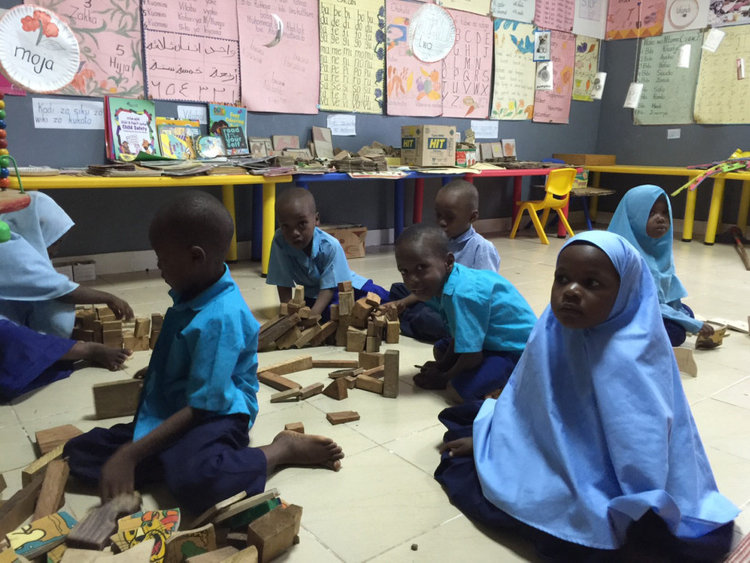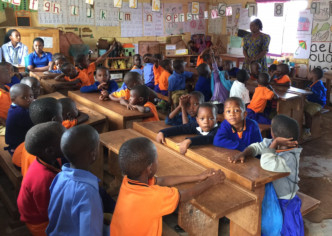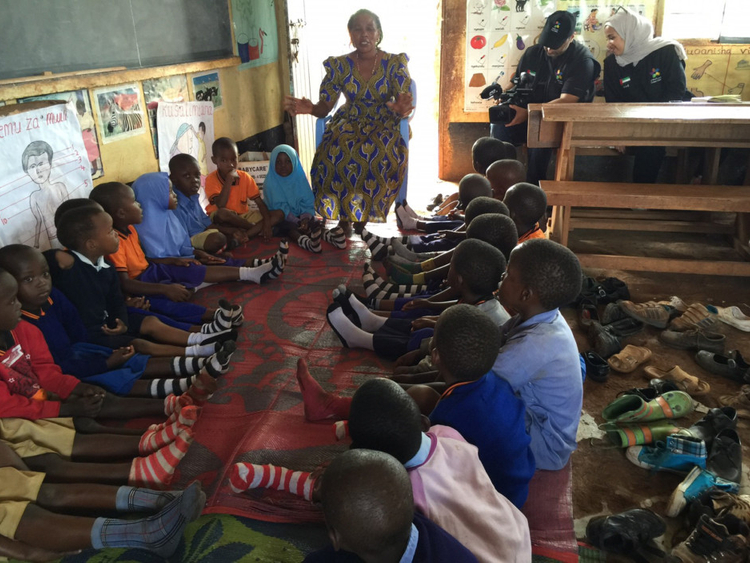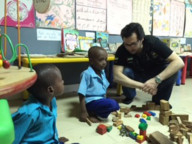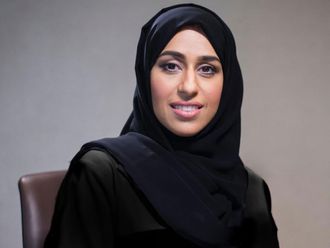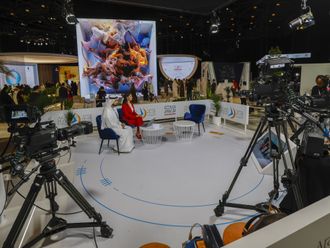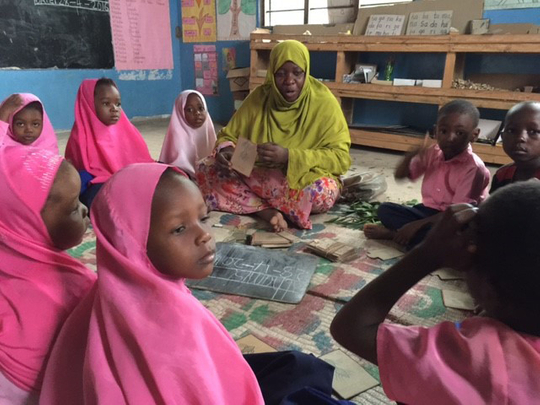
Dar Es Salam/Zanzibar: With an objective to strengthen the foundation of education in Tanzania, Dubai Cares, part of Mohammad Bin Rashid Al Maktoum Global Initiatives, launched two early childhood development programmes last week.
The two programmes, one each for mainland Tanzania and the semi-autonomous archipelago of Zanzibar, aim at improving access to quality pre-primary education in the country, seen as a stepping stone to improved learning in higher classes.
A pre-primary enrolment rate of 34.4 per cent suggests that the programmes are just what the doctor ordered for a nation with an estimated 23 million people under the age of 18.
In a pilot phase since October 2013, the programme has already shown results at more than 30 schools with improved enrolment rate and higher quality of learning.
Launching the programme at a press conference in Dar Es Salaam, the capital of Tanzania, Tareq Al Gurg, chief executive officer of Dubai Cares, said: “It gives me great pleasure to witness the success of our pre-primary education programmes in East Africa. In recent years, the Government of Tanzania has achieved great progress in facilitating access to early education programmes for children. Building on such progress, we must turn our attention to the quality of these provisions and tackle challenges such as shortage of qualified pre-primary teachers and adequate materials.”
Speaking to Gulf News, which covered the launch of the programmes in Tanzania and Zanzibar, he added: “We are pleased to work with the government of Tanzania and local partners to improve the quality of pre-primary education in the country, which will definitely go on to reflect in the overall improvement of education standards.”
The $7,260,223 (Dh26,670,430) Early Childhood Development (ECD) programmes in mainland Tanzania and Zanzibar are expected to reach 54,400 beneficiaries in four years.
In mainland Tanzania, the programme named ‘Fursa kwa Watoto’, which is Kiswahili for ‘Opportunities for children,’ is being implemented through two models. Model one is setting up quality pre-primary classes in existing primary schools and model two is creating satellite centres in rural areas where the primary schools are not at a walking distance for four- and five-year-old students. The programme will directly reach out to 29,400 students in four years.
The programme also aims to train 780 pre-primary teachers across mainland Tanzania, with more than 300 teachers already trained.
“We are aiming to shift the paradigm of early childhood education in the country. With the help of our partners we explored the situation on the ground and tested different models and after nearly 18 months of pilot we are rolling out the programmes. We are closely monitoring the progress and in the next stage we would like the government to come in and take ownership of the programme and scale up at the national level,” said Al Gurg, after visiting schools that have gone through the pilot phase
Craig Ferla, director of Children in Crossfire, one of the NGOs that is implementing the programme on the ground, said: “This programme is the most exciting initiative of its type in pre-primary education in Tanzania. As well as improving access to and quality of pre-primary, it is also building evidence of models that improve learning outcomes for children and are scalable for government and development partners to invest in.”
Like mainland Tanzania, the story of education in Zanzibar is not too rosy. With limited public investment in pre-primary and low enrolment in government schools, early childhood development in the Indian Ocean archipelago needs an urgent push.
For example, the teacher-student ratio at pre-primary in Zanzibar is as low as 1:115, with the majority of schools not having teachers trained to handle children at the age of four to five.
The classrooms also lack the required material to stimulate children’s growth.
Under these circumstances, Dubai Cares joined hands with the Ministry of Education and Vocational Training – Zanzibar, the Madrasa Early Childhood Programme and the Aga Khan Foundation (AKF) in developing a multi-pronged programme that has created learning material, enhanced enrolment levels as well as developed various teacher training modules.
The programme directly benefits 25,000 children through contextually relevant, cost-effective and replicable pre-school approaches, with 11,000 students already reached.
Under the programme, teachers are trained to source learning material from the local environment to teach children in an effective and stimulating manner, while engaging parents and community members in the process of learning.
“Teachers from the rural communities and religious schools who don’t have formal qualifications are being given opportunities to attain degrees through bridge courses and these teachers are proving to be more adept than university graduates. We are proud to be able to provide these opportunities in partnership with Dubai Cares, to hundreds of people who were earlier not recognised as teachers by the government,” Abid Mallick, country Director of Aga Khan Foundation in Tanzania, said.
The intervention targets 100 out of 675 pre-primary schools in Zanzibar, and includes the training of 900 government and community pre-school teachers.
Through advocacy and awareness, enrolment in pre-primary schools has increased from 30.9 per cent in 2013 to 50 per cent this year.
The programme has encouraged communities to set up new schools, while also creating clusters where community school managements from neighbouring villages come together and help each other in finding solutions to various issues.
Developing pre-primary education
Fursa Kwa Watoto overview (Tanzania)
Dubai Cares is funding and monitoring early childhood development programme in Tanzania through two models:
1. Quality-enhanced pre-primary classes in existing primary schools
2. Quality pre-primary classes in satellite centres (centres in rural areas where the primary schools are too far for 4- and 5- year-old children to walk)
Implementation of both models
1. Teacher training and mentoring
2. Effective community-based school leadership
3. Stimulating learning environment based on modern techniques
4. Parent engagement and partnership
Programme benefits
Direct beneficiaries: 29,400 students
Indirect beneficiaries: 1,620,000
Schools impacted: 210
Teachers trained: 780
Programme duration: October 2013 to December 2017
Investment: Dh14,315,713
Partners: Ministry of Education – Tanzania, Unicef, Children In Cross Fire, Maarifa Ni Ufunguo, CSR Africa Mathematica
Watoto Kwanza overview (Zanzibar)
Dubai Cares in partnership with the help of local partners is working towards increasing access to quality pre-primary education in Zanzibar.
Key components:
1. Upgraded and improved capacity of pre-primary teachers to deliver quality teaching and learning.
2. Creating conducive and stimulating pre-primary teaching and learning environment.
3. Enhanced support by education support systems to pre-school teachers
Programme benefits
Direct beneficiaries: 25,000
Schools impacted: 100
Teachers trained: 900
Programme duration: January 2014 to December 2017
Investment: Dh6,152,455
Partner: Aga Khan Development Network, Ministry of Education and Vocational Training, Madrasa Early Childhoo Programme – Zanzibar.
A glimpse at education status in Tanzania.
• Only 34.4% attend pre-primary school.
• Only 50.6% passed primary school leaving exam in 2013
• Only 8% at benchmark maths skills in Grade 2
• Only 8% are have benchmark reading ability for Grade 2
• Estimated 23 million people in Tanzania are under the age of 18
• The Government of Tanzania made one year of pre-primary education mandatory through its Education and Training Policy of 2014, but the policy has not been strictly implemented.


